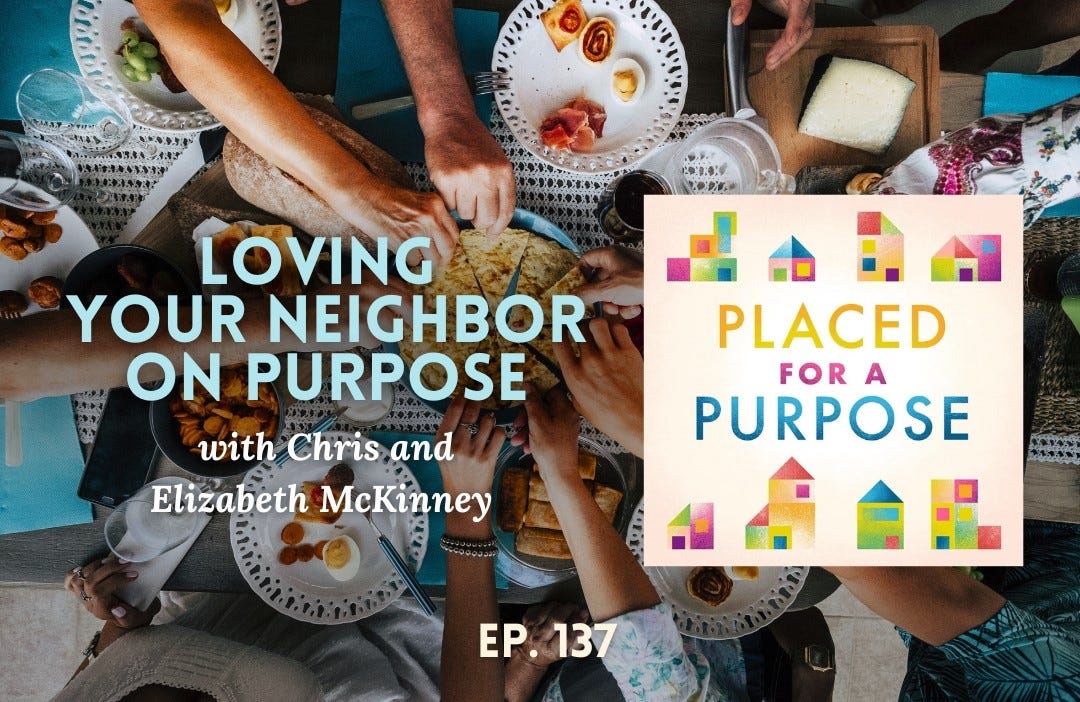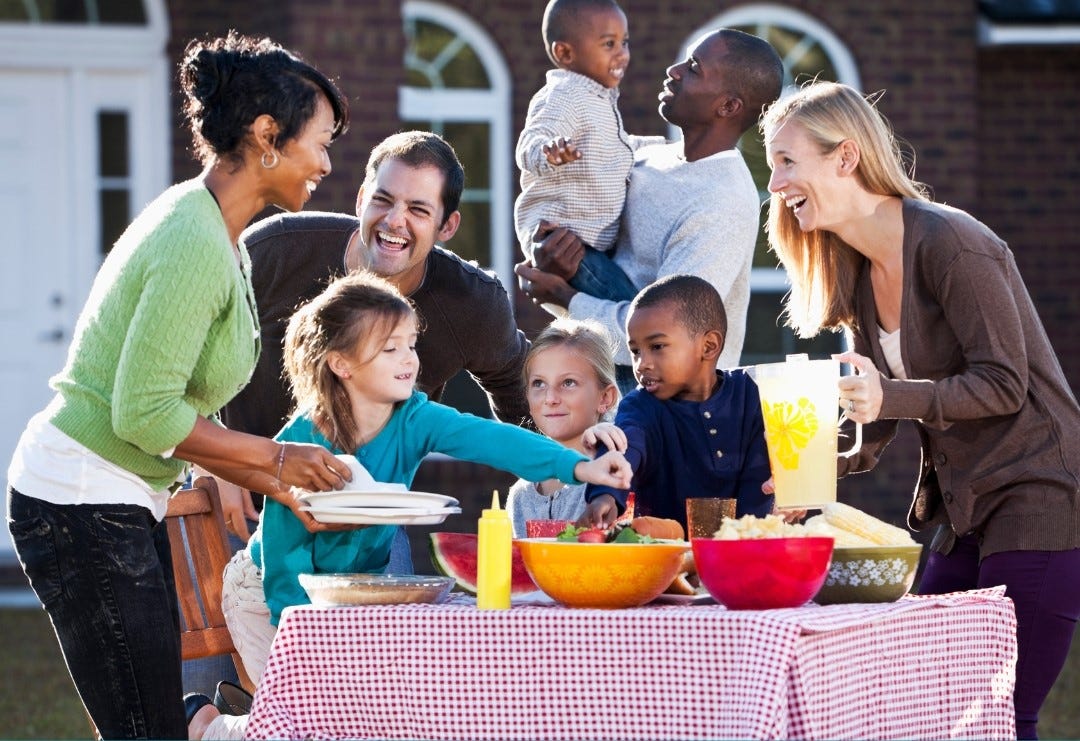Loving Your Neighbor on Purpose
People are longing for connection
In order to love your neighbor, you have to know your neighbor – but that’s often easier said than done. If you’ve felt trepidation about getting to know your neighbors, stepping out of your comfort zone might be the hardest part. The good news is that taking even small steps to connect with your neighbors lets you enter into the work that God is already doing in their lives.
In this next episode of our new series, Loving Your Neighbor as Yourself, Austin sits down with Chris and Elizabeth McKinney to hear about their passionate desire to connect with people in their Columbia, Missouri neighborhood. They’ll describe the way God turned their ministry - which started as a small fish fry - into a podcast, two books, and ongoing training for others who are interested in connecting, growing, reaching, and serving their own communities for Christ.
In this episode, you’ll hear about:
The McKinney’s story of starting small and seeing God grow their ministry
How persistence, not perfection, is the best way to connect with others
Meaningful steps to making lasting connections in your neighborhood
Overcoming time constraints and fear of awkward conversations
Why the unchurched – and the “de-churched” – are often hungry for God
This episode will challenge the cultural norm of leaving neighbors alone and encourage you to step out of your comfort zone, even just a little bit, so that you can “go where God is” right outside your front door.
Highlights from Austin’s Conversation with the McKinneys
Chris and Elizabeth live here in Columbia, Missouri with their four daughters. The kids range in age from high school down to elementary school. Elizabeth enjoys walking (with a weighted vest!), and Chris likes fishing and pickleball.
Their neighborhood ministry began when Chris was in seminary and Elizabeth was doing ministry alongside him while also busy at home with 4 kids born in 5 years. She was feeling lonely and isolated and realized that packing up the kids and driving across town to find connection and community was going to be too difficult. Instead, she decided to get to know their neighbors.
Chris and Elizabeth got to know an older couple living behind them called Bingo and Angie. Bingo liked to fry things. They decided to invite some neighbors to come for a fish fry. Around 12 people joined them, so it wasn’t a large gathering, but a small beginning – and they could never have imagined how it would grow.
After the success of the fish fry, the McKinneys decided they wanted to continue connecting with their community. They did an Easter egg hunt and then a block party. When 50-60 people showed up to the block party, they began to realize that many people in their community were longing for connection.
What Is a Good Neighbor?
The culture tells us that being a good neighbor means to wave politely, take out your trash, and mind your own business. Even as a believer you can get tricked into thinking that being a good neighbor is leaving your neighbors alone. The inevitable result of this disconnection is loneliness and isolation.
In Scripture, God is constantly pursuing his people and creation and is calling us out of our front doors to interact with our neighbors. One of the reasons it’s so important to connect in today’s world is that more and more people are leaving the church, but it turns out that they would be willing to return if someone befriended them and re-invited them.
One of the reasons it’s so important to connect in today’s world is that more and more people are leaving the church, but it turns out that they would be willing to return if someone befriended them and re-invited them.
Reaching the Unchurched - and the De-churched
Often when people leave the church, they’re casualties – they’ve had church hurt. They either experienced hurt firsthand or heard about pastors who have been involved in scandals and abuses of power. Maybe they got out of the habit of going to church during COVID. Or they’ve moved and had trouble finding a church in their new city.
It’s easy to assume, when you see someone in your neighborhood who is new, that they’re anti-religious, or at least apathetic at best. Your default may be to leave them alone. But there’s actually a likely chance that they will be interested in going with you to church or at least having spiritual conversations.
When you reach out to your neighbors, you’ll be able to build relationships with people from different kinds of backgrounds. You’ll meet people who are unchurched, de-churched, have different worldviews, and come from different racial and ethnic backgrounds. It’s a lot like a family in that just like you don’t choose your family, you don’t choose your neighbors.
When you see them as people and not as projects, and they see you as real and genuine, you’ll be able to talk about your lives, your kids, parenting, books you’re reading, podcasts you listen to, and Jesus – the biggest part of your life. Many of them will show spiritual interest and come with you to church and maybe join your small group.
Being Salt and Light
Looking at the history of Christianity, going back to the early days, it grew through hospitality. It grew because Christians were different - they gave to others freely, they respected women, they took care of orphans, they were honest in their business dealings. Those things are all needed today, and the modern world can be transformed one neighborhood at a time through love in action just like in ancient times.
The goal of reaching out is for neighbors to see the positive impact of Christianity and feel safe having hard conversations about the difficult questions of life. And you don’t have to have all the answers to sit down and have a nice, long talk! All you need is the willingness to be present, honest, and vulnerable.
True witness involves living out the Beatitudes: being poor in spirit, meek, merciful, and hungry for righteousness. Christians are to be salt and light to the world—distinctive, visible, and transformative. Your visible good deeds - right in your own neighborhood - will glorify God and lead others to him.
Placed for a Purpose
The McKinneys are still doing ministry in their neighborhood, organizing gatherings like book discussions and hot wings nights. Outside of their neighborhood, they are equipping and training people all over the country to love their neighbors and see what God might do through them.
As part of their ministry, they’ve written a book called Placed for a Purpose, which outlines a simple and sustainable vision to love and reach your next-door neighbor. It’s based on the idea that each of us have been placed by God for a reason and that he’s already at work – you’re just joining him when you start reaching out. Your address is not an accident and neither is your neighbor’s.
It’s a special feeling to realize that your neighborhood is a mission field; you don’t need to go anywhere for God to be able to use you. God’s already working, and he’s inviting you to partner with him.
Recommended Resources:
Placed for a Purpose: A Simple and Sustainable Vision for Loving Your Next-Door Neighbors by Chris and Elizabeth McKinney
Neighborhoods Reimagined: How the Beatitudes Inspire Our Call to Be Good Neighbors by Chris and Elizabeth McKinney





